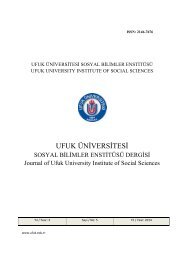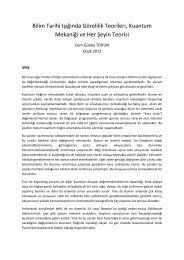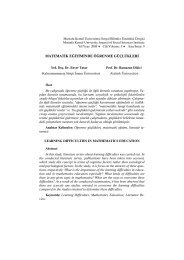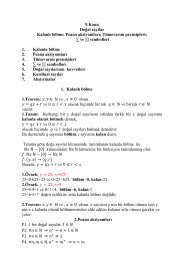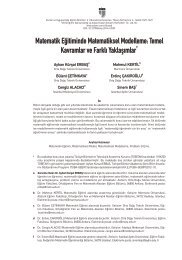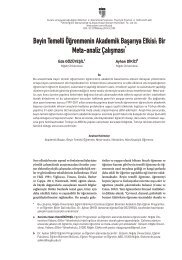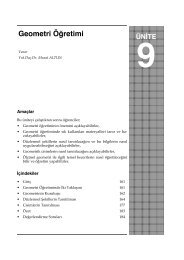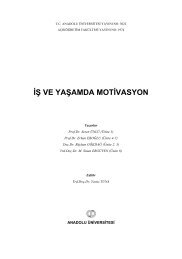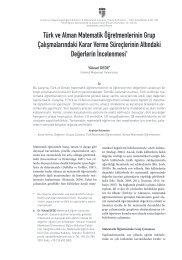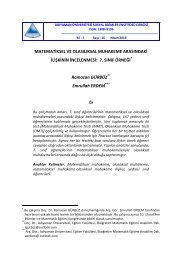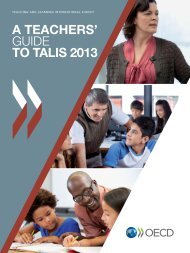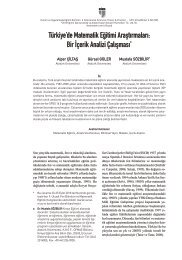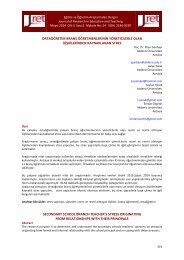NEWSLETTER
2015-12-98
2015-12-98
Create successful ePaper yourself
Turn your PDF publications into a flip-book with our unique Google optimized e-Paper software.
Discussion<br />
The market closed because of the<br />
putsch.<br />
make a comment, so uncertain<br />
was the situation. In the<br />
midst of this overwhelming<br />
tension, one would hear the<br />
participants making jokes<br />
about the situation, such as<br />
the rather repetitive lunch<br />
menu: due to the acute<br />
food shortage caused by the<br />
putsch, the hotel manager<br />
had arranged for a relative<br />
living in the outskirts of the<br />
city to provide him with chickens, which were served for<br />
lunch every single day!<br />
Four days after the coup, the negotiations between<br />
General Diendéré and the presidential delegation had<br />
concluded in favour of an amnesty for General Diendéré<br />
and the eligibility of the former CDP (Congrès pour la<br />
démocratie et le progrès, Blaise Compaoré’s party) members.<br />
This was clearly a threat to peace; how could the<br />
population accept such a deal? Violent protests were to be<br />
expected. On the Monday following the coup, the regular<br />
army marched into Ouagadougou, publicly announcing its<br />
intention to disarm the RSP while avoiding any fighting.<br />
The night before the announced military manoeuvre, rumours<br />
had spread that the army would march into the city<br />
overnight. I packed my backpack with what I considered<br />
important belongings in case I had to suddenly flee from<br />
the fighting during the night and woke up at dawn, worried<br />
by some voices I could hear outside my bedroom window<br />
which led to a large terrace roof. A glimpse through the<br />
window reassured me; it was only the Radio France International<br />
two man team broadcasting the morning news<br />
from the terrace. No military confrontation could have<br />
taken place since the army had not yet reached the city.<br />
People gathered at sunset cheering on the highway as they<br />
waited for the anticipated entry of Burkina Faso’s regular<br />
army, who vowed to disarm the RSP. That morning, 11<br />
the streets, which had remained silent and empty since the<br />
coup, seemed to come back to life. In the afternoon, Diendéré<br />
publicly gave rather contradictory and inadequate<br />
apologies, asking the people of Burkinabé to forget about<br />
the putsch but claiming full responsibility for it and promising<br />
to restore civilian government.<br />
But, by the evening, the situation radically changed;<br />
we heard that Michel Kafando had asked for protection<br />
from the French Embassy. A veil of silence covered the<br />
city again. Macky Sall, President of Senegal, who had<br />
come over the weekend with Thomas Boni Yayi, President<br />
of Benin, to negotiate with Diendéré, had failed to find a<br />
resolution to the crisis in spite of his political weight and<br />
diplomatic experience. Following an extraordinary summit<br />
meeting of ECOWAS (Economic Community of West<br />
African States), another delegation of presidents 12 arrived<br />
11<br />
On Monday 21 September.<br />
12<br />
A delegation comprising the Presidents of Ghana and Benin,<br />
as well as the Vice-President of Nigeria.<br />
13<br />
On Tuesday 22 September.<br />
14<br />
Nicolas Burq (Orsay), David Dos Santos Ferreira (Nancy)<br />
and Jérôme Le Rousseau (Orléans).<br />
a couple of days later to calm down the situation. This time<br />
their intervention had an effect; a week after the coup, 13<br />
an agreement was passed and a peace deal was presented<br />
to the Mogho Nabaa, King of Burkina Faso’s leading Mossi<br />
tribe. Michel Kafando, who had been under house arrest<br />
for some days after his first detention, was now free and<br />
announcing his return to power.<br />
The school went on running in the midst of the turmoil,<br />
a form of resistance to Diendéré’s diktat. The applications<br />
to climate change and seismology we had planned for the<br />
second week were never discussed during the school. The<br />
flights of the speakers 14 who were due to arrive at the end<br />
of the first week had been cancelled and the airport remained<br />
closed until the middle of the second week. Yet,<br />
the participants were eager and happy to learn about the<br />
fundaments of FIOs and indeed learned a lot of abstract<br />
material during the talks and informal discussions with the<br />
speakers. A couple of participants from Benin had spent<br />
several days on a coach to reach Ouagadougou, having had<br />
to wait on the coach for the border to reopen, and were all<br />
the more determined to make the most out of the school.<br />
One could perceive the anxiety of some of the participants<br />
and most of the speakers but all agreed that, under the<br />
circumstances, it was best to go on with the talks. Keeping<br />
busy with mathematics, claimed many participants, was a<br />
very efficient way to dispel the worries, and various speakers<br />
asked to give more talks to keep their minds occupied<br />
preparing them. The particular circumstances the school<br />
was now held in were actually more propitious to informal<br />
interactions between the speakers and the participants<br />
than the more formal setup the school might have allowed<br />
for had the “event” not happened. I am very grateful to all<br />
the speakers and participants and admire their courage.<br />
Despite questions raised as to the sincerity of Diendéré’s<br />
public apologies, eight days after the putsch and one<br />
day after the Tabaski celebrations, the tension one had felt<br />
on the streets of Ouagadougou melted down and the sun<br />
dared to venture back. The preceding days had not been<br />
too hot, with sudden wind blasts and strong rain showers,<br />
as is to be expected during the rainy season. The city of<br />
Ouagadougou was now glowing with the pride of victory<br />
over the usurpers. With this coup, we (participants, speakers<br />
and organisers of the school) had unexpectedly borne<br />
witness to the complex, painful and still ongoing emancipation<br />
of the Burkinabé people from 27 years of dictatorial<br />
leadership and its ramifications.<br />
Sylvie Paycha is a Professor at the University<br />
of Potsdam, on leave from the Université<br />
Blaise Pascal, Clermont-Ferrand. Her<br />
research topics are pseudodifferential operators,<br />
renormalisation techniques and index<br />
theory. She was the co-organiser of two<br />
schools in Ouagadougou: “Index theory<br />
and interactions with physics”, 21–29 May 2009 (Research<br />
school co-funded by the CIMPA and the University of Ouagadougou,<br />
with the help of external funding), and “Fourier<br />
integrals and applications”, 14–25 September 2015 (School<br />
funded by the Volkswagen Foundation and co-organised<br />
with the University of Ouagadougou).<br />
EMS Newsletter December 2015 47




